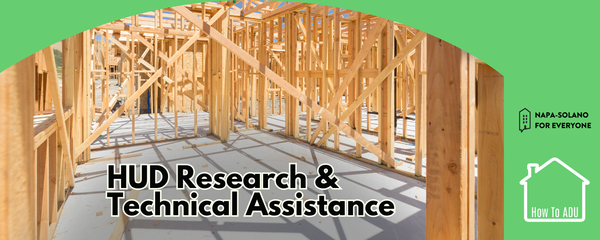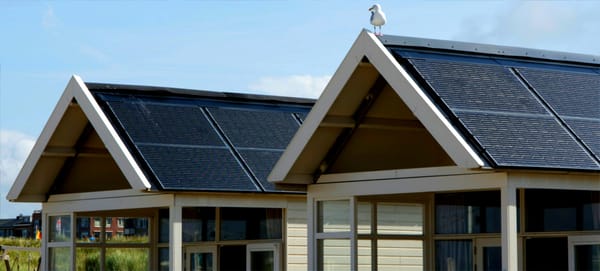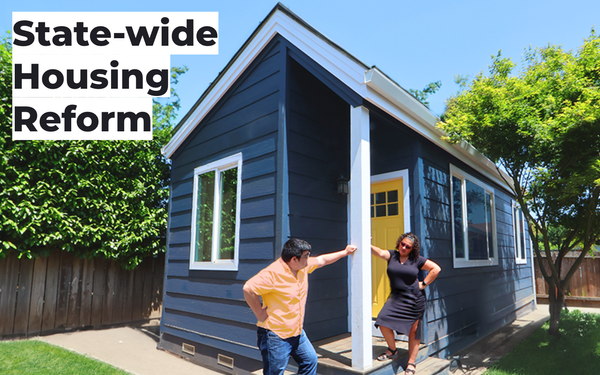Early notes on Social Housing and Public Housing options
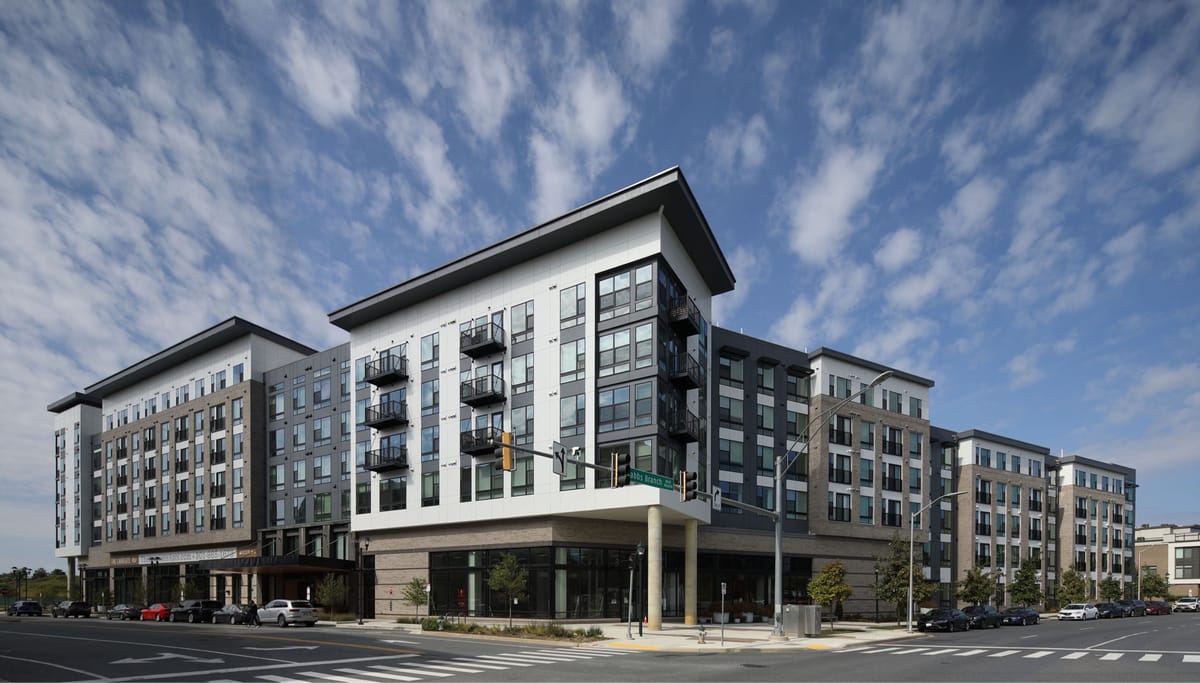
Government-owned housing has been successful in many parts of the world, but the United States has left this option largely unexplored for the past few decades.
I think that's about to change.
And my general feeling is that we owe it to ourselves to give it a shot, using best practices and lots of reporting/accountability.
If you're one of my free market readers, please bear with me.
Short summary of my notes
There was an excellent panel on this subject at YIMBYTown in Austin in February 2024.
Here are the YIMBYTown slides: https://docs.google.com/presentation/d/1VcMwqIVdi0M_vYvD8W6BNu4agOYvZsXI/edit#slide=id.p1
My briefest summary:
- Social housing can be successful
- Singapore
- Vienna
- Uruguay
- United States?!
- Best practices
- Anybody can apply to live in the development; you do NOT have to restrict its use to low income groups
- You charge market rate for some of the apartments; this actually helps subsidize the most affordable apartments
- You build in places where people want to live, near jobs and transit and other public resources
- The management of these buildings can be administered by the private sector and can be competitive and fair, all while the government owns the land or the building
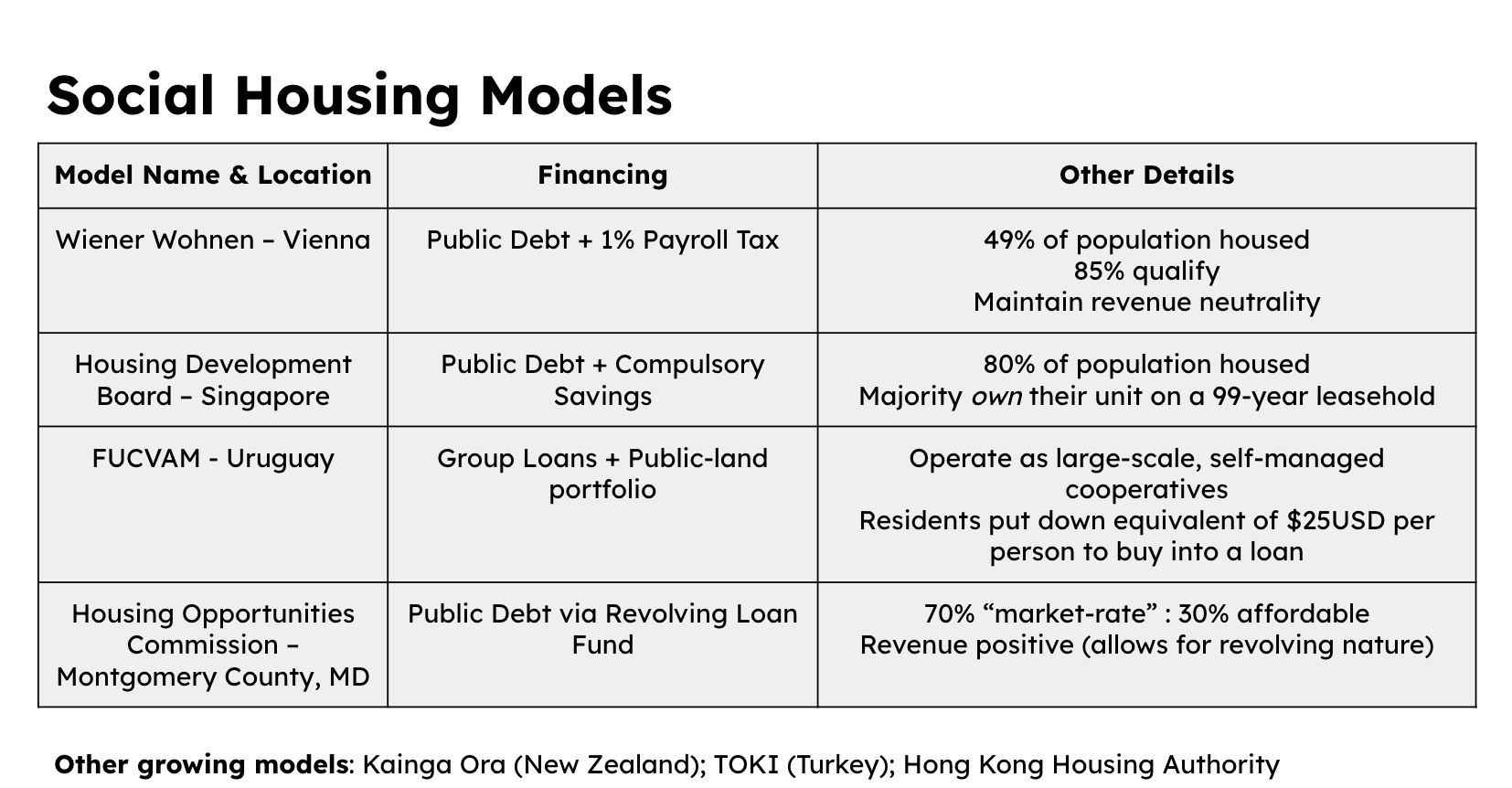
How does social housing look in practice?
When you do this right, it looks just like any other housing.
Remember, the majority of the apartments in this publicly-owned option are rented at market rate.
It is built in areas with transit, jobs, and access to public goods like schools, first responders, etc.
In Montgomery County, Maryland, just outside of Washington DC, we see a public project that appears to be working just like that.
I'll try to visit and film this spring. Here is some coverage by Vox reporter Rachel Cohen (long form article) (x thread)
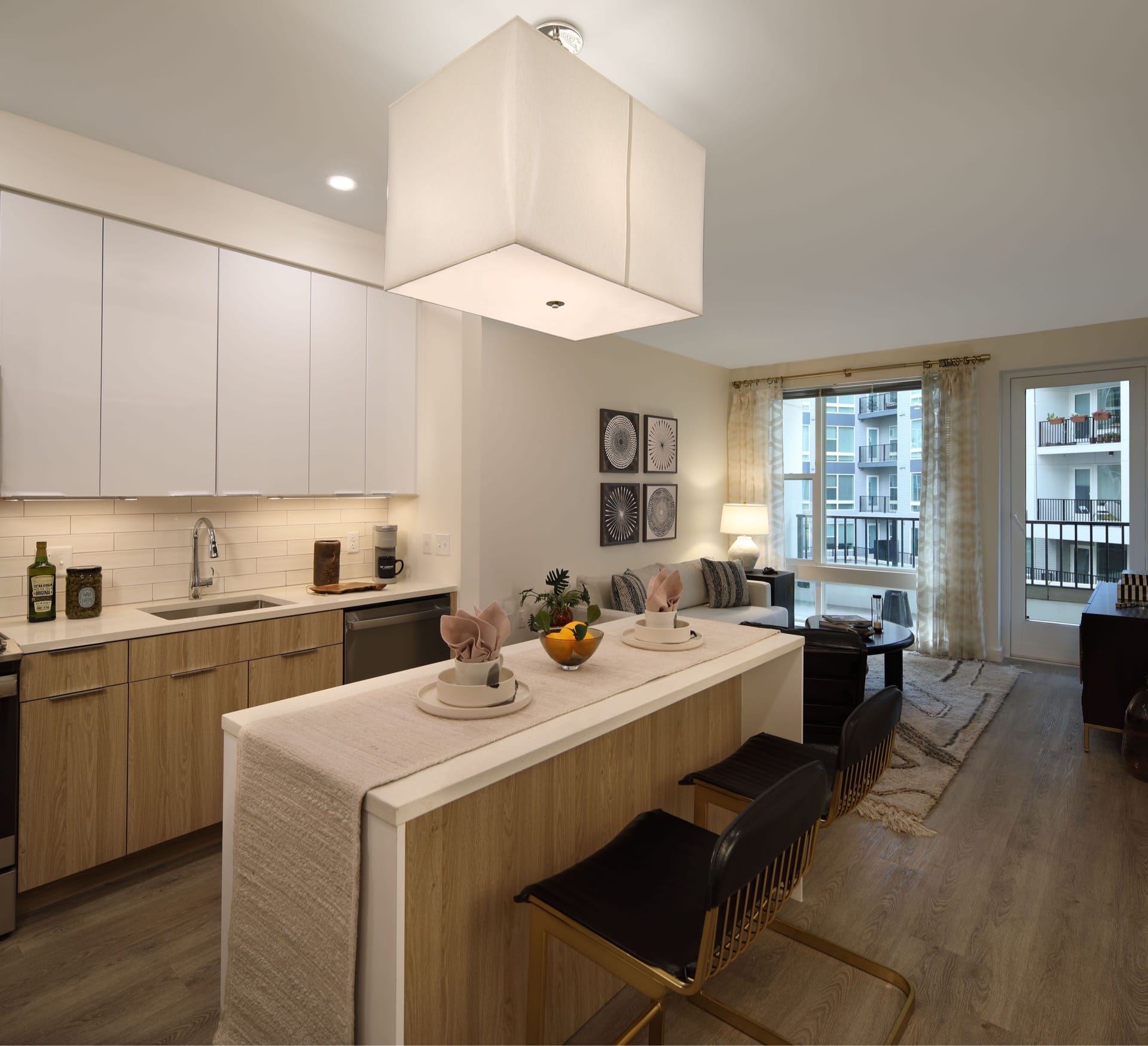
It's called The Laureate in Rockville, MD. And it's 70% market rate housing, 30% Affordable.
This was a stalled private development project a couple years ago, and nobody could make the financing work until the county housing authority stepped up.
[edit 4/8/2024:]
This is made possible by the special financing circumstances of this project and its use of the Housing Production Fund. "The Housing Production Fund ("HPF") is a $100 million revolving fund that HOC developed in partnership with Montgomery County to finance the production of new, mixed-income housing across the county. Approved by the County Council in March 2021, the HPF provides revolving, low-cost, construction-period financing to HOC developments. Permanent financing repays the initial HPF investment, which is subsequently returned to the fund for investment in the next HPF transaction. At least 30% of all HPF projects is set aside for affordable housing, and through this mixed-income financing model HOC is able to deliver significant new affordable housing units without relying on scarce federal affordable housing resources like tax credits or Section 8 Project Based Rental Assistance." https://www.hocmc.org/extra/1088-the-laureate.html
Another reason it's possible for The Laureate to run profitably with such a high number of Affordable units, is that it is exempt from some taxes. In the New York Times, Conor Dougherty explains, "Because H.O.C. projects are exempt from property taxes, and because it is willing to take a low rate of return, the building can profitably operate with double the normal number of affordable units."
Special thanks to developer Bobby Fijan for providing a quick reference point in the same area from a much older (and presumably less valuable) building where the property taxes are $3000/unit. Since The Laureate is a 268 unit building, that's a significant exemption.[/edit]
“We’re 97 percent leased today, and it’s just been incredibly successful and happened so fast”
--Marks quote within Vox article
The Laureate is revenue positive so the whole thing pencils and can allow for the bonds to be paid off, and for money to be re-invested in new projects.
Why social housing?
Why not?
I think that trying this is low cost, high reward.
And amongst those rewards, we might delivery better terms for privately-owned housing.
Trying publicly owned housing is relatively cheap, and has the potential of great returns
The vast majority of housing in this country is still provided by the private sector.
Having a handful of public options won't put private developers out of business.
But it could give us important data and experience about how publicly owned developments operate.
And if publicly owned housing works in the US, as it has in places like Vienna and Singapore, then we can expand those programs.
If these housing projects face challenges, then we'll see that in the data and they will show higher vacancy rates, financial problems, or other issues which will be transparent and open to the public.
We're already spending billions of dollars on this
We might even save money with publicly owned housing options.
Publicly owned housing, when operated correctly, should pay for itself.
It should also lower the amount of money the government has to spend treating related issues such as:
- homelessness
- substance abuse
- medical emergencies
- illegal activities
- rental voucher administration
We could make it better for privately-owned housing at the same time
Right now, the government is already involved in the construction of deed-restricted Affordable housing.
And there are drawbacks to the current approach, which places the burden on private sector developers.
This section was getting a bit long so I'll do a separate write up about it on another day.
The important thing I want to say here is that if our local governments are already mandating deed-restricted Affordable housing, it makes more sense for them to do it through specific publicly-owned projects than to require it from all privately owned developers.
This reduces the harmful effects of inclusionary zoning requirements on private developers, while it still captures the benefit of deed-restricted Affordability.
It properly accounts for cost of this Affordability instead of distributing that cost into the private sector where we have very little insight into its effects.
What if we did a TON of public housing?
Is this the only thing we need to solve the housing shortage?
In my mind, no, I would not want to rely 100% on publicly owned housing to address our residential needs.
Even cities that have lots of great public housing (like Vienna) don't rely 100% on it either.
A good way to think about this would be to watch the vacancy rates and application wait lists at publicly-owned options.
If the publicly owned options are very competitive with privately-owned housing options, you'll have low vacancy and long wait lists. And those are indications that you can build more publicly-owned housing.
In a world where there is ample public housing, and vacancy rates are somewhere reasonable across the board, a lot of the worst parts of our housing shortage get mitigated.
When people are unexpectedly evicted, they have a safe option to move to.
When people face unusual increases in rental rates, there is a public option that they can turn to where the rent increases are not raising at the same pace.
And finally, if the publicly-owned housing fails to compete with privately owned options, that will be evident too and we can curb our use of public money to build new housing or to preserve permanently Affordable housing.
What comes next?
As the Vox piece above mentions, interest in publicly-funded housing is growing around the country.
"Montgomery County was getting so many inquiries, they decided to host a convening in early November, inviting other officials — from places like New York City, Boston, Atlanta, and Chicago —to tour The Laureate and talk collectively about the public developer idea"
https://www.vox.com/policy/2024/2/10/24065342/social-housing-public-housing-affordable-crisis
California legislature has been looking into social housing for over 2 years now with bills sponsored by Alex Lee
And now there are national politicians testing the waters with messaging about a Green New Deal for Housing, and repealing the Faircloth Amendment to allow federal money to go back into publicly owned housing development (that's an oversimplification, but y'know)... https://www.politico.com/news/2024/03/21/aoc-sanders-unveil-green-new-deal-for-housing-00148263
Watch this space...
While I love the decentralized nature of ADUs, it's very interesting that more and more jurisdictions are seriously looking at publicly owned housing options.
If you know me, you know I think "MORE IS MORE!" and it's all worth trying.
work cited / further reading
Gix, Camille and Reed, Dan, panelists. "Thinking outside the market box" YIMBYTown Conference, 26 Feb. 2024, Thompson Conference Center, UT Austin, Austin TX.
Cohen, Rachel M. "What if public housing were for everyone? Local governments are trying a new way to address the housing crisis." rachel.cohen@voxmedia.com Feb 10, 2024
Powell, Benjamin and Stringham, Edward Peter, Housing Supply and Affordability: Do Affordable Housing Mandates Work? (2004). Reason Foundation Policy Study 318, pp. i-v, pp. 1-45, Los Angeles: Reason Public Policy Institute, April 2004, Available at SSRN: https://ssrn.com/abstract=1676277


